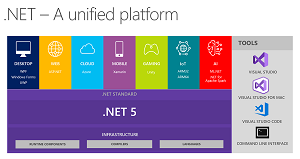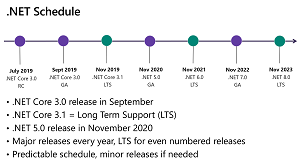News
Final Go-Live .NET 5 Release Candidate Ships Ahead of Nov. 10 Debut
Twenty-eight days to liftoff.
Having been deemed "feature complete" and "near final" and "go live" for some time now, .NET 5 is out in a second and final Release Candidate, scheduled for a Nov. 10 debut during .NET Conf 2020.
.NET 5 is a milestone in Microsoft's transition from the aging, proprietary .NET Framework to its open source, cross-platform future -- a journey that started with .NET Core way back in 2016.
"At this point, we're looking for reports of any remaining critical bugs that should be fixed before the final release," said Microsoft's Richard Lander, program manager for the .NET, in an Oct. 13 blog post.
As he did in announcing RC1, Lander listed many improvements that come in .NET 5, including:
However, Microsoft had hoped for more features to be included in .NET 5, but some functionality will have to wait, delayed by COVID-19 and other factors.
 [Click on image for larger view.] .NET 5 (source: Microsoft).
[Click on image for larger view.] .NET 5 (source: Microsoft).
During Build 2020, he said: "Last year, we laid out our vision for one .NET and .NET 5. We said we would take .NET Core and Mono/Xamarin implementations and unify them into one base class library (BCL) and toolchain (SDK).
"In the wake of the global health pandemic, we've had to adapt to the changing needs of our customers and provide the support needed to assist with their smooth operations. Our efforts continue to be anchored in helping our customers address their most urgent needs. As a result, we expect these features to be available in preview by November 2020, but the unification will be truly completed with .NET 6, our Long-Term Support (LTS) release. Our vision hasn't changed, but our timeline has."
 [Click on image for larger view.] The .NET Schedule (source: Microsoft).
[Click on image for larger view.] The .NET Schedule (source: Microsoft).
Following his practice of focusing on a few key features in recent preview posts, Lander this month targeted:
- C# 9 Pattern Matching: "C# 7.0 introduces the notion of patterns, which, abstractly speaking, are syntactic elements that can test that a value has a certain 'shape,' and extract information from the value when it does."
-
ClickOnce: According to documentation, "ClickOnce is a deployment technology that enables you to create self-updating Windows-based applications that can be installed and run with minimal user interaction. Visual Studio provides full support for publishing and updating applications deployed with ClickOnce technology if you have developed your projects with Visual Basic and Visual C#."
Lander listed the goals of the project as:
- Enable a familiar experience for ClickOnce in Visual Studio.
- Enable a modern CI/CD for ClickOnce publishing with command-line flows, with either MSBuild or the Mage tool
-
Windows Arm64: "ARM64 was a key focus for performance investment, resulting in much better throughput and smaller binaries," Lander said. The associated GitHub issue says: "We are in the process of adding support for Windows ARM64 as part of the .NET 5.0 project. As a result, you will be able to run Windows Forms, WPF and ASP.NET Core apps on Windows ARM64 devices, such as the Surface Pro X."
Lander said MSI installers are available for Windows Arm64, but also noted work to be done: "The .NET 5.0 SDK does not currently contain the Windows Desktop components -- Windows Forms and WPF -- on Windows Arm64. This late change was initially shared in the .NET 5.0 Preview 8 post. We are hoping to add the Windows desktop pack for Windows Arm64 in a 5.0 servicing update. We don't currently have a date to share. For now, the SDK, console and ASP.NET Core applications are supported on Windows Arm64."
.NET 5 has already been powering Microsoft's own .NET site for some time, and Lander expressed confidence in the offering.
"We're now so close to finishing off this release, and sending it out for broad production use. We believe it is ready. The production use that it is already getting at Microsoft brings us a lot of confidence. We're looking forward to you getting the chance to really take advantage of .NET 5.0 in your own environment."
It can be downloaded here. Release notes are here. To use it, the latest preview versions of Visual Studio (including Visual Studio for Mac) are required.
About the Author
David Ramel is an editor and writer at Converge 360.